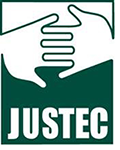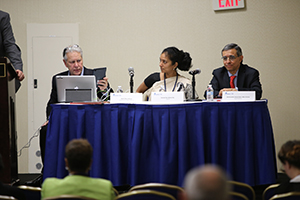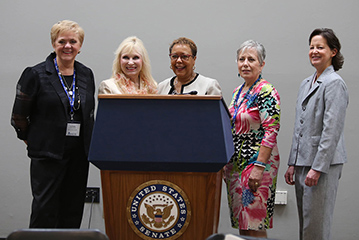25 Apr2016
By Sungti Hsu
AACTE is proud to support two daylong colloquia at the annual conference of NAFSA: Association of International Educators in Denver, Colorado, May 31 and June 3.
On Tuesday, May 31, the Global Learning Colloquium on Teacher Education will focus on the theme “High-Impact Global Learning Experiences and Curricular Design.” The program runs 9:00 a.m.–3:00 p.m. and will address how to prepare preservice teachers to work with diverse populations, understand how their practice affects both local and global communities, and be culturally responsive in pedagogy and curriculum choices. Participants will hear from global education organizations as well as from teacher educators from California State University, Kent State University (OH), Southern Connecticut State University, the University of Connecticut, the University of Missouri, and the University of Nevada-Reno.
11 Apr2016
By Kristin McCabe
Are you an expert who can speak on teacher quality issues? Are you interested in discussing education research, policy, and innovation for the knowledge-based economy with colleagues from China and the United States?
The College of Education and Behavioral Sciences at the University of Northern Colorado (UNC) seeks prospective teacher-quality panelists and general participants for an international conference in Beijing this June. There is no registration charge, but space is limited.
17 Mar2016
By Jerrica Thurman
 Did you know that AACTE has a growing international footprint? Although “American” is our first name and our membership is primarily domestic, the world is watching—and engaging—more widely, especially online.
Did you know that AACTE has a growing international footprint? Although “American” is our first name and our membership is primarily domestic, the world is watching—and engaging—more widely, especially online.
We recently explored who is engaging with AACTE from around the world and discovered audiences in more than two dozen countries are visiting our web sites, connecting with us via social media, or accessing the Journal of Teacher Education (JTE) online.
During 2015, the most frequent visitors were from the following countries:
09 Mar2016
By Kristin McCabe
 The 28th annual seminar of the Japan-U.S. Teacher Education Consortium (JUSTEC) will be held November 4-7, 2016, at Japan’s Ehime University. Conference organizers invite proposals for paper and poster presentations by May 15 under the theme “Collaborative Teacher Education With Local Communities.”
The 28th annual seminar of the Japan-U.S. Teacher Education Consortium (JUSTEC) will be held November 4-7, 2016, at Japan’s Ehime University. Conference organizers invite proposals for paper and poster presentations by May 15 under the theme “Collaborative Teacher Education With Local Communities.”
This year’s theme is conceptualized this way:
When we look at trends in formal education, the centralized administrative approach prevails more and more in both the United States and Japan. Such an approach has been pointed out by a number of reports to often produce detachment of teachers’ practices from local conditions and needs. On the other hand, when we look into region-oriented alternative approaches, we can still discover a considerable number of successful cases with alternative methods. JUSTEC 2016 sets a conference theme, “Collaborative Teacher Education with Local Communities,” to explore regionally developed teacher education practices, created with local schools and related parties.
18 Feb2016
By Kristin McCabe
 AACTE has selected the Global Gateway for Teachers, offered through the School of Education at Indiana University (Bloomington), to receive the 2016 AACTE Best Practice Award in Support of Global and International Perspectives. The award will be presented at the 68th AACTE Annual Meeting Welcoming Session, Tuesday, February 23, at The Mirage Hotel in Las Vegas.
AACTE has selected the Global Gateway for Teachers, offered through the School of Education at Indiana University (Bloomington), to receive the 2016 AACTE Best Practice Award in Support of Global and International Perspectives. The award will be presented at the 68th AACTE Annual Meeting Welcoming Session, Tuesday, February 23, at The Mirage Hotel in Las Vegas.
The Gateway program, in existence in various forms for over 40 years, aims to enhance and engage the professional preparation of future educators by offering them experiences in schools, homes, and communities of culturally and linguistic diverse groups in 18 countries and in domestic placements on Navajo reservations and in urban Chicago. Participants are engaged in 18 weeks of student teaching abroad as well as domestically where they immerse themselves in the language, the culture, and the educational system of that nation or community.
The program is directed by Laura L. Stachowski and enjoys strong support from the School of Education’s administration, including Dean Emeritus Gerardo Gonzalez and Interim Dean Terrence Mason.
02 Feb2016
By Kristin McCabe
Two new studies commissioned by the National Center on Education and the Economy (NCEE) credit the collaborative professional learning of teachers in British Columbia, Hong Kong, Shanghai, and Singapore with their students’ strong performance on international assessments. NCEE’s Center on International Education Benchmarking organized a half-day forum last month featuring panel discussions of these countries’ policies that support such systems—and what lessons the United States should draw from them.
Rather than treating professional development as an add-on program such as monthly workshops, the studies say, successful education systems embed it broadly. Teacher-led collaborative learning is deliberately planned into structures such as well-defined career ladders, mentorship programs, and schools’ daily schedules. Although some of these features can be found in U.S. districts, none is widely used or as robust as described in the reports, and panelists advocated for a stronger systems approach.
21 Jan2016
By Deborah Koolbeck
The U.S. Department of Education Office of Postsecondary Education (OPE) this week announced its 2016 grant competitions and timelines. Plan now for these upcoming opportunities (follow the hyperlinks for details):
The Office of Higher Education Programs facilitates grant programs that promote and expand access to postsecondary education, increase college completion rates for U.S. students, and strengthen the capacity of colleges and universities:
06 Oct2015
By James O’Meara and Sharon Robinson
On September 25, 2012, United Nations Secretary-General Ban Ki Moon launched the UN Global Education First Initiative (GEFI) for making quality education available to all children, young people, and adults. This year, on the third anniversary of the GEFI launch, leaders from AACTE answered his call for assistance by committing to revive a longstanding partnership with the International Council on Education for Teaching (ICET). But why ICET, and why now?
What Is ICET?
ICET is a nongovernmental organization (NGO) working with educator preparation providers (EPPs) globally to ensure all learners will have access to a high-quality education in which educators are appropriately qualified and recognized as motivated and committed professionals and practitioners.
22 Jun2015
By Kristin McCabe

Does your teacher preparation program have any international alumni who might like to be interviewed for an article in a study-abroad magazine?
Elaina Loveland, editor-in-chief of NAFSA’s International Educator magazine, is looking to profile some international teacher education students who received degrees in the United States but went back home to teach or start schools in their home countries. International Educator is a bimonthly publication about global education and exchange, published by NAFSA: Association of International Educators.
17 Jun2015
By Lucy Berrier
Nominations for all of the 2016 AACTE awards are now open on AACTE’s online submission site. To read detailed submission information, please refer to the official Call for Entries.
Now in its 20th year, AACTE’s awards program recognizes member institutions’ exemplary programs as well as individuals who have made noteworthy contributions to education preparation.
16 Jun2015
By Michelle Kotek
AACTE’s Washington Week kicked off with diverse perspectives, enlightening anecdotes, and compelling conversations at the special conference “Progress and Factors That Contribute to Closing the STEM Achievement Gap,” sponsored by the National Science Foundation. Five presenters joined AACTE leaders on two panels discussing ways to improve learning outcomes of underrepresented populations in the STEM fields.

Hall Davidson, Vasanta Akondy, and Armando Sanchez-Martinez at STEM Conference
The conference began with presenters Armando Sanchez-Martinez, manager of Editorial Santillana in Mexico, and Vasanta Akondy, co-manager of the Verizon Innovative Learning Program (VILP), who together provided a global perspective on innovative solutions to increase access to STEM education in Mexico and India.
Sanchez-Martinez presented a comprehensive look into Mexico’s educational landscape, including a detailed explanation of sociocultural factors that contribute to local achievement gaps and of the current educational movements and solutions to closing the gap. Akondy highlighted the importance of VILP and its efforts to recruit more girls in India into the STEM fields. The aim of this program is to provide a community network of support while focusing on student engagement and providing technological resources to underfunded schools.
28 Apr2015
By Jerrica Thurman

Participants in Day on the Hill join Sharon Robinson during Washington Week
Every year, AACTE’s Washington Week attracts hundreds from around the nation. Read these testimonials from recent participants about the value of attending:
13 Apr2015
By Kristin McCabe
Are you thinking of applying for a federal “First in the World” (FITW) grant? Learn about the program during a free webinar with the U.S. Department of Education this Wednesday, April 15, 4:00-5:00 p.m. EDT.
The FITW program is run through the Department’s Fund for the Improvement of Postsecondary Education office. Intended to spur collaborative innovation among institutions of higher education and partnering nonprofit organizations, FITW grants target improved educational outcomes, college affordability, and an evidence base of effective practices. The grants are funded at $60 million this year, including a $16 million set-aside for minority-serving institutions.
23 Mar2015
By Donna Sacco, Amanda Bush and Christine DeGregory
In the three decades since A Nation at Risk was released, the state of America’s education system relative to other countries’ has been a matter of heated debate. Along the way, public opinion has placed the onus for our schools’ perceived failure on teachers and their preparation, and education policy has echoed this assumption through an array of accountability measures for teachers and preparation programs.
One driver of the continued misconception about U.S. teacher quality is the highly publicized results of international large-scale education assessments (ILSAs) that suggest America’s students are performing far below other nations. At January’s press briefing for the report The Iceberg Effect, lead researcher and report author James Harvey explained that ILSAs have been misused and that the science behind them is highly questionable, akin to comparing apples to oranges.
05 Mar2015
By Kristin McCabe and Deborah Koolbeck
On Tuesday, March 10, the U.S. Department of Education’s International and Foreign Language Education Office will host a free webinar to assist minority-serving institutions (MSIs) with applications for Fulbright-Hays grants. An additional webinar will be open to all audiences the following day.







 Did you know that AACTE has a growing international footprint? Although “American” is our first name and our membership is primarily domestic, the world is watching—and engaging—more widely, especially online.
Did you know that AACTE has a growing international footprint? Although “American” is our first name and our membership is primarily domestic, the world is watching—and engaging—more widely, especially online. The 28th annual seminar of the
The 28th annual seminar of the  AACTE has selected the
AACTE has selected the 

